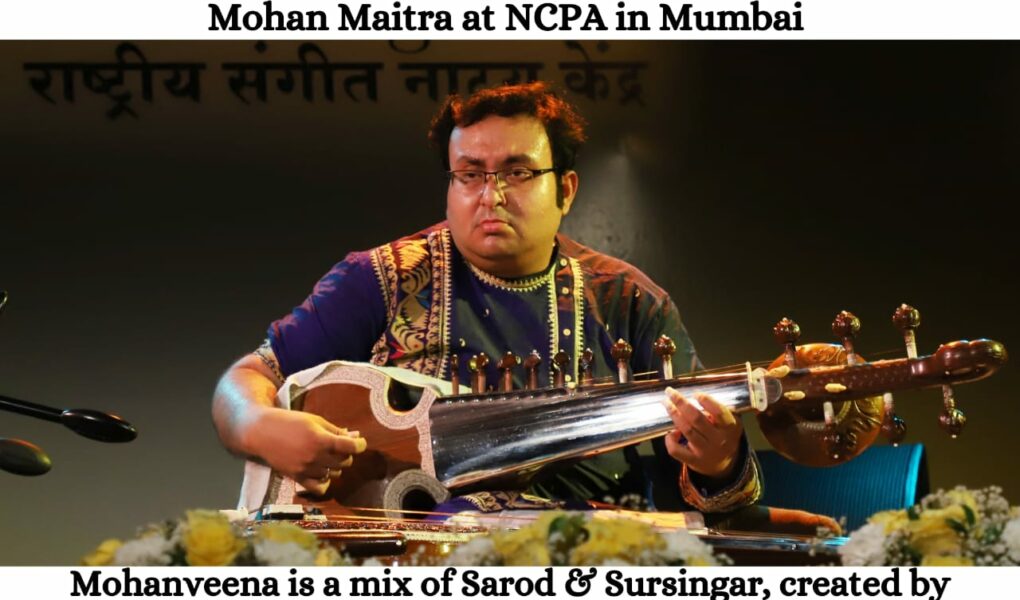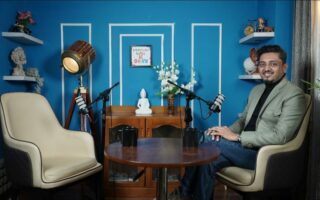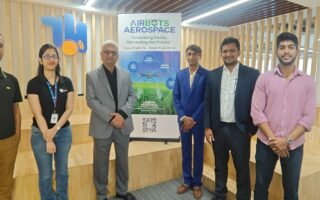Most of today’s sangeet samarohs and music conferences are led by the instruments like sitar, sarod, santoor, flute, slide guitars, violin, etc. as the performers mainly focuses on improving the tonal quality and the sound production of these instruments, improvising tremendously on their individual style of playing, thereby resulting in highly evolved instruments. Concurrently, most of the bygone instruments like Seni Rabab, Surshringer, Sur Rabab, Surchayan, Vichitra Veena, Rudra Veena etc which once ruled the royal stages, today find their presence more in the museums rather than the concert stages. However, many of such instruments has been revived by one of the most popular and renowned Sarod players of the country Joydeep Mukherjee, who in his early fourties have been working for the last ten years in bringing those bygone glories back to the performing stages. He has been bestowed by Sangeet Natak Academi’s prestigious Ustad Bismillah Khan Yuva Puraskar in Hindustani instruments for the year 2019 in Sarod and Sursingar, becaming the first ever musician in the 70-year history of Academi who received the Academi prize for the instrument Sursingar apart from sarod. The Honourable Prime Minister of India, Narendra Modi, has also praised Joydeep for his unique work in February 2023. Today, Pt. Mukherjee and Sursingar are quite synonymous in the classical music world.
Very recently Joydeep has revived the 16th Century Seni Rabab (also called Tanseni Rabab or Dhrupad Rabab) which was invented by the legend Miyan Tansen in the Royal Court of the Emperor Akbar and a 19th Century extremely rare Rabab invented by Ustad Abdullah Khan of the Senia Shahjehanpur Gharana, made in Bengal during 1880s. It was a 16-month long project and is creating headlines throughout the National media, making Pt. Mukherjee a National Youth icon in the field of Classical Music. “After the revival of the Mohanveena instrument of my Dadaguru, Pt. Radhika Mohan Maitra and Sursingar of the 18th century, I decided its enough. It takes a lot of efforts to play one instrument correctly and nicely and I am already playing three: Sarod, Mohanveena & Sursingar”, says Mukherjee. “However, on 26th February 2023, when the Honourable Prime Minister Narendra Modi Ji took my name in ‘Mann Ki Baat’ and appreciated my efforts in the revival of Sursingar, I changed my mind. I decided to give the best of the best of my efforts in this field of music as the PM’s words were very inspiring for a minuscule musician like me – who don’t come from a family of musicians and whose Guru is not that renowned”, he added. He continues, “I decided to walk in the route of my dadaguru (Guru’s Guru), the legendary musician and Sangeet Natak Academi awardee of 1971, the great Pt. Radhika Mohan Maitra, who could play 7-8 instruments at ease with a huge repertoire of ragas. My Guru, Late Pt. Pranab Kumar Naha was a student of Pt. Radhika Mohan Maitra from 1959 to 1981, for around 22 years and he got intensive training from Pt Maitra as far as Ragas and instruments are concerned. My Guru taught me the intrinsic and advanced ‘Been-baaj’ whatever he received from Pt. Matra, taalim of some 550+ Raagas, countless compositions, different styles of Sarod, Rabab & Sursingar playing and different taals. My musical journey started under his tutelage in 1987, when I was four years old and continued till early this year until his demise. He was such a person with wisdom and an encyclopedia to me, having answers of my every question and knowledge of every raagas that I have ever heard! However, he preferred to keep himself confined and down profile. It was his extreme humbleness that he kept himself separated from the limelight. Around 2012 he sent me to Pt. Debasish Sarkar, an amazing percussionist who taught me the intricacies of rhythms, advanced concepts of taals and guided me through innovative projects.”
It is to be noted that Joydeep Mukherjee hailed from a middle class ‘non-Gharadaar’ family. His father was a bank employee and mother a housewife. But both of them had musical trainings – father learnt vocal for around 10 years and mother was a guitarist before marriage. So, when the young kid Joydeep showed inclination towards music from his toddler days, his family was little skeptical in the beginning as it should not hamper his studies. Being held from a middle-class Bengali family it was imperative that Joydeep should go for formal education and ultimately head for a job to earn his living. He maintained a brilliant academic record throughout his career. He cracked the West Bengal JEE in 2001 and completed his Engineering with First Class Honours from Techno India under Maulana Abul Kalam Azad University of Technology and also secured a first-class 2nd in MBA from the prestigious Symbiosis in Pune in 2008. He served the corporate world as a marketing and research consultant for 11 years with six figure monthly salary before venturing full time in music in 2019.
But doesn’t it was too risky to leave such a high-profile job? “Yes, it was a tough decision to take. But at the same point of time my work on the revival of extinct instruments had already begun. My family including my wife and in-laws were very supportive. I was working 17-18 hours a day in office and I was having health issues. I realized if I devote the same energy to my country in the field of music, I can do a lot of things. Today I can say, I spend a lot of sleepless nights looking at my 2-year-old son, his future, his education, my duties towards him!! I was restless. Next day my parents and wife asked me my concern and I expressed them the reasons of my anxiety. The support that they give provided me power. Same day I resigned. I had to serve the notice period of about 5 months and I enjoyed every moment of my notice period. I might not be a very rich man but am a happy man,” he replied.

What challenged you faced? “Covid was the biggest challenge. Programs, conferences stopped. But it had a positive impact too. A lot of organizations have called me for online concerts and it were free of cost. Ha ha. But I haven’t said them ‘No’ to anyone. At that point of time every videos in Facebook was having very high viewership and I performed in such 30+ online programs, free of cost, showcasing my Dadaguru’s Mohanveena & Sursingar. It helped me to reach to a lot of audiences. I uploaded 52 rare ragas in 52 weeks in my YouTube channel during Covid which are of great help to many students and musicians as well. So, whatever came in as a threat, I tried to make it an opportunity. And this attitude worked. Today many of such organizers who asked me to perform free during Covid, avoids me in concerts or gatherings. But believe me, I don’t have any grudges towards them. In that difficult hour when the world was indoors, I tried to give positive vibe to a lot of people with my instruments and music. Hoped it helped people whose blessings I am getting now.”
Speaking about his future plans, Mukherjee said, “I need to re-establish the Tanseni Rabab and the Sur Rabab in the current age just like I am doing to establish the traditional Mohanveena and Sursingar.” He was appreciated by the seniormost classical musician of India Padma Bhusan Pt. Arvind Parikh, aged 98 and a disciple of Ustad Vilayet Khan Sahab, in Mumbai earlier this year for his works and performance capability. He is the only musician in the current times who is taking the legacy of his Senia Shahjehanpur Gharana and Indian Classical Music as well in five different fretless instruments – Sarod, Mohanveena, Sursingar, Tanseni Rabab and Sur Rabab after the legendary music maestro Late Pt. Radhika Mohan Maitra.



